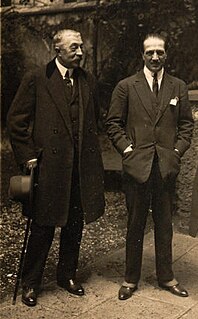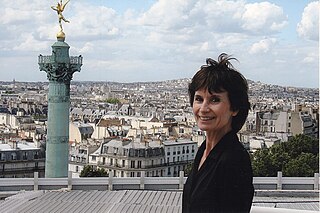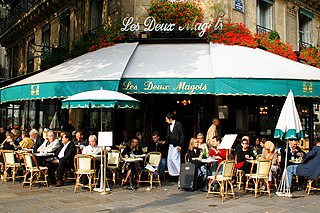
Amédée-Ernest Chausson was a French romantic composer who died just as his career was beginning to flourish.

Paul Marie Théodore Vincent d'Indy was a French composer and teacher.

Eugène Marie Henri Fouques Duparc was a French composer of the late Romantic period.

Pierre Eugène Onfroy de Bréville was a French composer.
Marios Varvoglis was a Greek composer.

Charles Bordes was a French music teacher and composer.

Les XX was a group of twenty Belgian painters, designers and sculptors, formed in 1883 by the Brussels lawyer, publisher, and entrepreneur Octave Maus. For ten years "Les Vingt", as they called themselves, held an annual exhibition of their art; each year twenty international artists were also invited to participate in the exhibition. Artists invited over the years included Camille Pissarro, Claude Monet, Georges Seurat, Paul Gauguin, Paul Cézanne (1890), and Vincent van Gogh.
Guy de Lioncourt was a French composer.
Marcel Labey was a French conductor and composer.

Marie Blanche Selva was a French pianist, music educator, writer and composer of Spanish origin.
Marie-Léontine Bordes-Pène was a notable French pianist, who premiered major works by César Franck, Vincent d'Indy and others. She married a brother of the composer Charles Bordes, and was known by the surname Bordes-Pène thereafter. In 1889-91, the painter Jacques Émile Blanche painted her portrait.
Street Without a Name is a 1934 French drama film directed by Pierre Chenal and starring Constant Rémy, Gabriel Gabrio and Paule Andral. It is based on the 1930 novel La Rue sans nom by Marcel Aymé.
Édouard Souberbielle was a 20th-century French organist, Kapellmeister and music educator.
Amy Dommel-Diény (1894–1981) was a French musicologist and composer. She was a professor of harmony and counterpoint at the Schola Cantorum de Paris and at the Conservatoire de Strasbourg. She is the author of many books on music and music composition. In 1948, she published Le Cœur en Fête, a collection of popular songs, psalms and hymns. In 1973, she published a new version of Gabriel Fauré's sonata for piano and violin. She also had correspondence with Charles Koechlin and Gabriel Marcel.
Léon Vallas was a 20th-century French musicologist.
Henri Jules Joseph Nibelle was a French organist, choral conductor and composer.
Noëlie Pierront was a 20th-century French organist, concertist and music educator.

Martine Bailly is a French classical cellist who held the position of supersoloist, principal first cello of the Orchestre de l'Opéra national de Paris for 26 years.
















